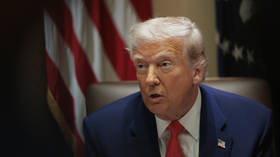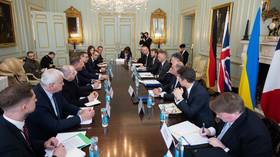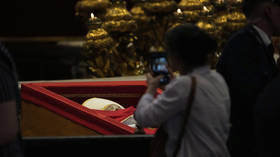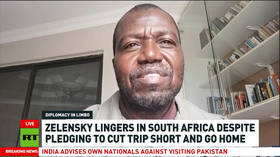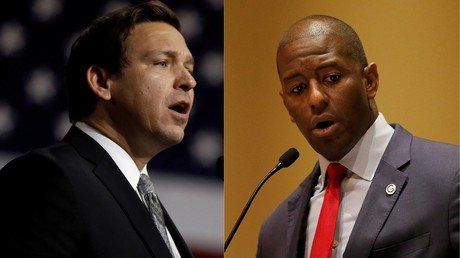‘Attempts to meddle’ in Russia elections add to long history of US interference in democracy
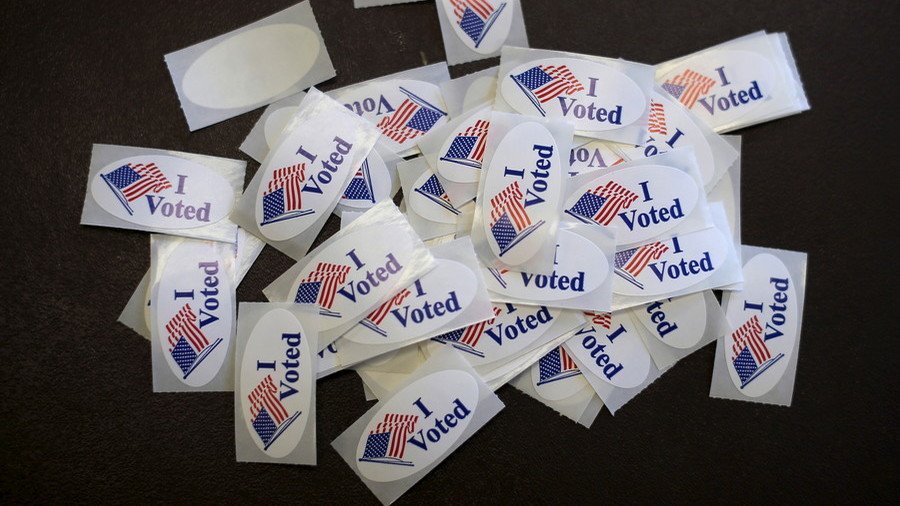
A senior Russian diplomat claims the US is attempting to meddle in Russian elections. If true, it certainly wouldn’t be the first time America stuck its proverbial nose where it doesn’t belong – and likely won’t be the last.
Ahead of Russia’s regional elections on Sunday, senior Russian diplomat Andrey Nesterenko said the US “certainly does” make attempts to meddle in the Russian electoral process.
As it stands, Washington has either been proven or suspected of meddling in the elections of almost every developed or US-neighboring nation in the world – an ironic statistic for the country that has barraged Russia with accusations of electoral interference since 2016.
READ MORE: Moscow has noticed US attempts to meddle in Russian election process – foreign ministry
Here, RT breaks down the (very) long list of countries whose democracies have been ‘helped’ by the US.
The Italian Job: Designer democracy
The US’s history of influencing political elections goes right back to the creation of the Central Intelligence Agency (CIA) in 1947. Using suitcases bursting with cash to meddle in the affairs of other nations was the longtime preferred method of persuasion for the agency, which began by ‘assisting’ non-Communist candidates in Italy from the late 1940s to the 1960s.
“We had bags of money that we delivered to selected politicians, to defray their political expenses, their campaign expenses, for posters, for pamphlets,”said Mark Wyatt, a former CIA officer, in a 1996 interview.
Japan-easy
The agency went on to pour millions of secret American funds into Japan’s center-right Liberal Democratic Party throughout the 1950s and 1960s. In a “major covert operation” the CIA funded its members and efforts to gather intelligence to fight Communism in Asia and undermine the Japanese left.
Iran-ic, isn’t it?
You’ve probably noticed the trend by now, but CIA documents declassified in 2017 revealed that the agency spent millions in 1953 to undermine Prime Minister Mohammad Mosaddegh, get their favorite candidates into parliament, and ultimately help the UK regain control of Iranian oil.
I Chile you not
In 2000, the CIA declassified a report in which they bragged about supplying their preferred candidate, Eduardo Frei Montalva, in Chile’s 1964 election with nearly $4 million. And if you thought that's as far as the agency went with their keen assistance, well, no. They also portrayed their chosen man as a “wise, sincere and high-minded statesman” while painting his leftist opponent Salvador Allende as a “calculating schemer.”
What do France, China, Paraguay, the Philippines, Panama, Poland, Costa Rica, Bolivia, Czechoslovakia, Nicaragua and Northern Ireland all have in common?
Over time, the burden of influencing foreign elections shifted from the CIA to various arms of the US State Department. 1961 brought the United States Agency for International Development (USAID), an organization with a $27 million annual budget to provide “foreign assistance.”
By 1983, Washington founded an extension of USAID, The National Endowment for Democracy (NED), an agency to do openly what the CIA did in private. That agency spent tens of millions of dollars each year to support their preferred political parties, movements and media in dozens of countries including, but not limited to: France, China, Paraguay, the Philippines, Panama, Poland, Costa Rica, Bolivia, Czechoslovakia, Nicaragua and Northern Ireland.
Bill and Boris, BFFs
A fact often forgotten during the mud-slinging media climate of today, is America’s intervention in Russian democracy in 1996, when Bill Clinton’s administration gave Boris Yeltsin a fully-staffed consultant team and lobbied the International Monetary Fund to give Russia a $10 million loan, some of which was put to use to secure him a second term in office.
Serbian smear
In 2000, US taxpayers successfully, though unwittingly, funded a huge campaign against Serbian nationalist leader Slobodan Milosevic. The takedown involved 5,000 cans of spray paint for student activists to scrawl anti-Milosevic graffiti and 2.5 million stickers with the slogan “He’s finished” in Serbian, helpfully printed on 80 tons of adhesive paper and delivered by a Washington contractor.
More recently – roughly two weeks ago – came fresh allegations of US political warfare, when Bosnia’s autonomous Serb Republic accused the US Embassy of using USAID to counter alleged Russian influence in the region.
What’s App, Cuba?
In 2014, the US reportedly created two social networking apps, ZunZuneo and Piramideo, and distributed them to Cubans free of charge. How helpful! The catch? Users were unaware the apps were created by a US agency or that they featured anti-government messages designed to undermine the country’s communist government.
Un-Bolivia-ble
During the Bolivian elections in 2002, USAID, which had been financing the eradication of cocoa farms, leaned on US ambassador Manuel Rocha to threaten Bolivians against voting for socialist candidate Evo Morales. Their concern? That Morales would commit the ultimate sin and “jeopardize American assistance and investment.” (Won’t somebody think of the dollars?!)
That same year, the agency also created the smooth-sounding “political party reform project” to help “build moderate, pro-democracy political parties that can serve as a counterweight to the radical MAS or its successors.” Nice.
Hungary, Hungary hypocrites
Lest you think meddling was an activity favored by long-gone administrations and CIA top brass, as recently as last year, the Hungarian government accused the US of interfering in their election campaign. The complaint followed the State Department’s Bureau of Democracy, Human Rights and Labor pledging a $700,000 windfall “for projects that… improve the quality of local traditional and online media and increase the public’s access to reliable and unbiased information.”
Sub-par putsches
Out of all of its (known) election meddling efforts to date, less successful were bids to manipulate the outcome of polls in Iraq and Afghanistan in 2009. Even the US defense secretary at the time, Robert Gates, later called termed it a “clumsy and failed putsch.”
READ MORE: The Russians are coming… to hit Florida's midterms, Democratic senator claims
Overall there’s no telling the lengths to which the US has gone, or will go, to export and protect its preferred version of ‘democracy’ around the world. More recent efforts by the State Department, or covert operations by the CIA, to influence elections without outright military intervention may not be known for decades, if at all.
Think your friends would be interested? Share this story!



